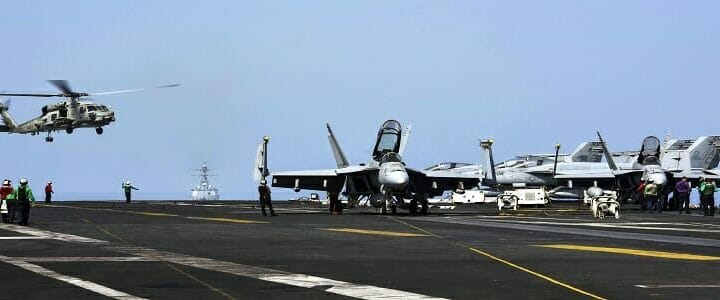In August 1998, as talk of impeaching President Bill Clinton was getting louder, he launched Operation Infinite Reach: cruise missiles aimed at a pharmaceutical plant in Sudan and an al Qaeda training camp in Afghanistan. The strikes were in retaliation for the bombings earlier that month of the U.S. embassies in Kenya and Tanzania. But many Clinton critics thought they were a brazen attempt to deflect attention from the building impeachment crisis and burnish the president’s national security credentials ahead of the midterm elections.
So you could be forgiven for thinking that the increased volume of the Trump administration’s saber-rattling with respect to Iran was due to the same motivation. After all, between demands for his tax returns, Democratic anger over his border policies (including the planned redirection of military construction funds under the National Emergencies Act) and lingering questions from the Mueller report, the president faces multiple political challenges at home. There’s nothing like a foreign policy crisis to focus national attention, right?
Except the world doesn’t stop spinning just because the president has a domestic crisis. Clinton’s missile strikes were a necessary and proper response to the al Qaeda attacks, which killed 224 people—including 12 Americans—and injured another 4,000. None other that Republican Sen. Orrin Hatch of Utah, who the following February would vote to convict Clinton on both charges he faced, defended the president’s actions at the time.
“These attacks were more than justified, and more than overdue,” the Washington Post reported Hatch as saying the time, adding he hoped the operation would be “a solid campaign rather than a momentary surge of limited strikes.”
Iran is still a threat, regardless of politics
The same is true here. Iran remains one of the largest threats to peace, not just in the region, but worldwide. Army Chief of Staff Gen. Mark Milley, whom the president has tapped to be the next chairman of the Joint Chiefs of Staff, often talks of the “four-plus-one” threats the nation faces: the four state actors or Russia, China, North Korea, and Iran, plus the non-state threat of transnational terrorism. The president’s domestic woes don’t negate that threat.
Citing new intelligence of threats against U.S. targets, the president ordered the accelerated deployment of a carrier strike group to the Persian Gulf, and the deployment of B-52 bombers from the U.S. Shortly thereafter, saboteurs used explosives to damage four oil tankers in the Gulf, in attacks reminiscent, although not as effective, of the deadly suicide attack on the USS Cole in Yemen in 2000.
Further raising fears of a Cole-like attack, satellite images showed Iranians loading missiles onto sailboats. Officials later said the Iranian have since removed some of the missiles.
And this past weekend, a Shiite militia in Iraq fired a rocket into Baghdad’s Green Zone, which landed about a mile from the U.S. embassy.
AL-Sadr is full of surprises
However, there was only one rocket, an encouraging sign that Shiite militias might not be as willing to do Tehran’s bidding as the ayatollahs would like to think. Most encouragingly, Iraqi Shiite cleric Muqtada al-Sadr, who became a “kingmaker” last year when his party took control of the Iraqi parliament, was quick to tamp-down any enthusiasm for sparking an Iranian proxy war with the U.S.
“I do not want a war between Iran and America and do not want Iraq to be a battlefield of such war,” Sadr wrote on Twitter after the attack. “We need a serious discussion among the leaders of the country in order to rule Iraq out of such war which would turn everything to rubble.”
By most indications, things have already settled down in the region. Now if they’d just settle down in Washington. Tensions in the Middle East will rise and fall. But barring drastic action on Iran’s part, we’re not going to war with them. No matter how bad the president’s troubles at home.




